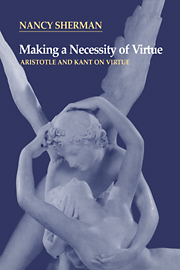Book contents
- Frontmatter
- Contents
- Preface and Acknowledgments
- Abbreviations and Notes on Translations
- Chapter 1 A New Dialogue
- Chapter 2 The Emotional Structure of Aristotelian Virtue
- Chapter 3 A Brief Stoic Interlude
- Chapter 4 The Passional Underpinnings of Kantian Virtue
- Chapter 5 The Shared Voyage
- Chapter 6 Aristotelian Particularism
- Chapter 7 Making Room for Practical Wisdom in Kantian Ethics
- Chapter 8 Perfecting Kantian Virtue: Discretionary Latitude and Superlative Virtue
- Bibliography
- Index
Chapter 7 - Making Room for Practical Wisdom in Kantian Ethics
Published online by Cambridge University Press: 18 December 2009
- Frontmatter
- Contents
- Preface and Acknowledgments
- Abbreviations and Notes on Translations
- Chapter 1 A New Dialogue
- Chapter 2 The Emotional Structure of Aristotelian Virtue
- Chapter 3 A Brief Stoic Interlude
- Chapter 4 The Passional Underpinnings of Kantian Virtue
- Chapter 5 The Shared Voyage
- Chapter 6 Aristotelian Particularism
- Chapter 7 Making Room for Practical Wisdom in Kantian Ethics
- Chapter 8 Perfecting Kantian Virtue: Discretionary Latitude and Superlative Virtue
- Bibliography
- Index
Summary
The last chapter discussed the notion of Aristotelian particularism, so called because of Aristotle's clear emphasis on moral judgment as a matter of assessing the particulars of a situation. Particularist theories, such as Aristotle's, have often been labeled intuitionistic, the tag bearing the implicit charge that focus on the particulars is incompatible with appeal to more general grounds or rules through which one's deliberation can be checked, and that such focus is characterized by an immediacy of discernment that bypasses discursive capacities. In the last chapter I countered both these charges.
First, despite Aristotle's own caution about reliance on rules, they nonetheless play a limited role in his theory, as summary guides that inform perception as well as heuristics and exhortatives useful for the practice of morality. What they are not, however, is either comprehensive or determinately guiding. As such, Aristotelian rules do not take the form of universal generalizations from which particular directives deductively follow. Rather, to the extent to which norms implicit in the virtues can be expressed by rules, those rules are qualified by the locution “for the most part” (hōs epi to polu). They hold generally and characteristically, but with no presumption that they will obtain across all conceivable cases. Even so, Aristotle more typically thinks of norms embodied in commitments to ends – “to be temperate,” “to be courageous” – with latitude as to the circumstances of fulfillment.
Information
- Type
- Chapter
- Information
- Making a Necessity of VirtueAristotle and Kant on Virtue, pp. 284 - 330Publisher: Cambridge University PressPrint publication year: 1997
